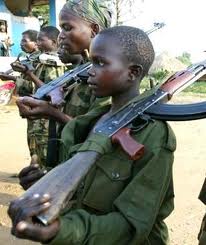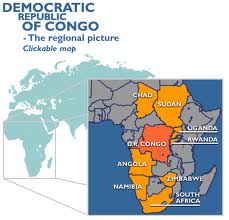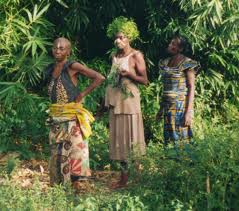 voiceseducation.org
voiceseducation.org The UN mission in the country says that 82 children, some as young as eight, have been rescued from an armed group. The children, including 13 girls, had been forcibly recruited in the past six months by the Mai Mai Bakata Katanga militia, a group active in Katanga province in the south-east of the country.
Forty of the rescued children have been reunited with their families and the others are said to be receiving care. What sort of future do these children face? Can they ever settle down to live a normal life after such early indoctrination?
Just this year, 163 children, including 22 girls, have been removed from the militia.
 www.bbc.co.uk
www.bbc.co.uk Their concerns seem justified, although foreigners like myself know little about the situation. However, in my opinion, to use any means available to get the justice they demand will simply make matters worse.
Monusco, the UN's stabilisation mission in DR Congo, revealed information that the children had been identified and separated from the militia through the concerted efforts of child protection agencies.
They are extremely concerned by continued reports of active recruitment by armed groups in eastern DRC. They said that the recruitment of underage children and forcing them to face unacceptable risks could constitute a war crime and those responsible must be held to account.
 commons.wikipedia.org
commons.wikipedia.org Here's a section of Still Rock Water, where Liliha views young boys in a similar situation through a vision:
After the murk lifts, my telescope vision focuses on a boy hiding in the bushes with another fuzzy image beside him. I don't force anything. After a moment, I drift down to merge with him, and then examine the mind of a young soldier in Rwanda.
Uri and his comrade, another fifteen year-old boy, have been soldiers of the Royal Military for months. They are puffed up with pride at their important mission—kidnap another boy of similar or younger age to join the army. A soldier had used this method to capture Uri. He and his friend hide behind spindly bushes to wait for a victim among the foraging villagers in the clearing ahead.
I hold myself ready to assist. Can I change Uri's mind?
Uri shakes with anticipation. Although he hasn't been allowed to visit his family in months, he eats at least once a day, wears new shoes and best of all, owns a gun. He hasn't killed anybody yet, but looks forward to the event with youthful enthusiasm. Ahead, the group of about fifteen people searches the soil for roots. Uri scrutinizes a boy of about twelve years, belly swollen, arms and legs thin. He looks the right type. He'll make a good soldier after they fatten him up.
I understand what I need to do. But I have to work out how to stop them. I whisper, 'It is better to starve, than to kill in a senseless feud'. Does he understand the concept? 'What are you fighting for?’ No reaction. I try to reach his emotion. 'Do you miss your home?’
A woman, probably the boy's mother, ambles away toward rough dwellings. She swivels to call her son, and then follows her companions, all searching the ground for food. Separated from the others by ten strides, he bends close to Uri's shelter to dig the earth with his hands.
Uri gathers himself, ready to pounce. His chest rises with expectancy. “You take his feet,” he says to his partner. “I'll grab him around the neck. Be quick.” The soil flashes by underneath his legs. Uri will reach him long before the villagers can help.
No. Let the boy alone. Rather than reason, I've got to do something drastic. I leave Uri and become one with the dry earth. I swirl my psyche and raise a cloud of dust.
Blinded for the moment, they stumble and fall to the ground, cursing in shrill voices.
I'm glad I've left the choking Uri.
The young boy spots the soldiers and dashes after his mother with a call. When he reaches her, they sprint to the safety of their village together.
Job done, I lift away.

 RSS Feed
RSS Feed






